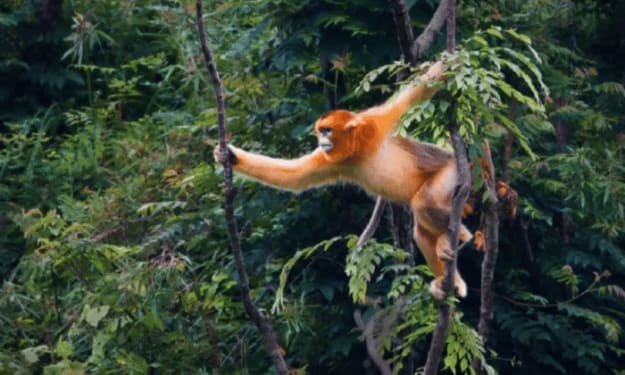Sudden discovery of monk-faced monkeys, extinct 80 years ago, causes unease: Is Stephen Hawking's prediction true?
Monk-faced monkey found extinct 80 years ago

There are countless species, with around 1.3 million currently recorded, but there are probably many more species that have not been discovered by man. Each species has its characteristics and the most special species on Earth is the human being, the most advanced creature that now dominates the planet.
Even though humans are the overlords of the earth, they are still inseparable from nature and other creatures. Therefore, man's relationship with nature and other creatures has always been interdependent and interdependent. In terms of the development of the Earth, living things have never gone from emergence to extinction, there have never been any exceptions. One might argue that some creatures have lived for hundreds of millions of years, but would they have been able to maintain their existence if it had been longer?
The biggest underlying reason why we can't break this rule is that living things will always go extinct due to various factors. For example, if the Earth were destroyed, would all life on the planet disappear very quickly? Of course, this may be a very small probability, but it is enough to show how difficult it is for living things to survive for a long.
After civilization was born and began to develop, the exploitation of the Earth became unstoppable, which in turn profoundly changed the face of the planet. The balance of the Earth's landscape was upset and many of the planet's creatures gradually became extinct due to the presence of humans. Once a creature is extinct, it means it cannot reappear, because there is no magic in the world to bring back from the dead.
That's why every time scientists announce the discovery of an extinct creature, people are left with a look of disbelief. For example, scientists announced the discovery of the monk-faced monkey, which has been extinct for 80 years. When this news came out, people were highly concerned and asked the question in unison: Why has the extinct creature reappeared? Is there some kind of magic?
The sudden appearance of the monk-faced monkey did catch people off guard, but scientists are excited because they can start studying monk-faced monkeys again and update the list of creatures.
This phenomenon reminds people of what Stephen Hawking said. Stephen Hawking has publicly predicted that the Earth will be destroyed in 200 years.
During his lifetime, Hawking made many predictions and warnings related to this, such as not trying to approach aliens and controlling global warming. But the most famous was Hawking's suggestion that in 200 years, the Earth will be short of resources and the planet will become uninhabitable for humans, who will then need to move to a new planet.
This possibility was then linked to the appearance of monk-faced monkeys as an anomaly that heralded the gradual and mysterious uncontrollability of the Earth, and that Hawking's prediction might come true.
The monk-faced monkey is a type of monkey that lives in the Amazon rainforest. The monkey is ugly and resembles a monk-faced monkey, hence the name. When people first discovered monkeys, their populations were already small, and with climate change and human development, the monkeys' habitat was encroached upon and destroyed, leading to their extinction. For a long time afterward, scientists found no more traces of monkeys and decided that they were extinct creatures.
The basic conditions for determining the extinction of an organism are: there are no suitable environments and conditions for its survival on earth, and no trace of the organism has been found in the core area for a long time. If all the conditions are combined, the repopulated creature is considered extinct. The monk-faced monkey, on the other hand, is only considered extinct if the above conditions are met.
But the truth is that some creatures live in other environments and hidden corners. These areas may not have been explored by scientists, or they may have been considered impossible to exist. We cannot deny that the genes and adaptations of organisms change over time. Organisms naturally adapt gradually to their habitat, changing their genes over time to survive.
Therefore, the reappearance of extinct organisms such as those in human society does not mean that there are anomalies on the planet, but rather that they are 'hidden'. It is impossible to monitor every corner of the planet in real-time, and those missing areas are likely to be new areas for them to live in.






Comments
There are no comments for this story
Be the first to respond and start the conversation.